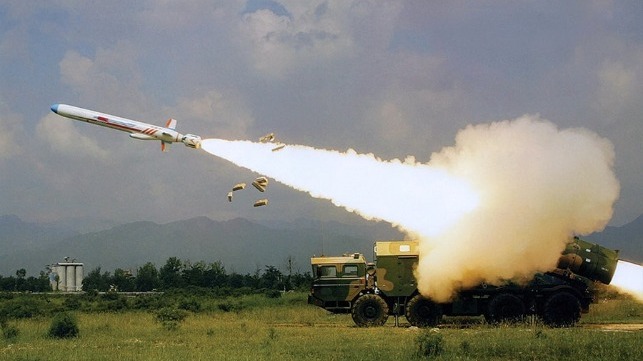Report: U.S. Navy's Anti-Ship Missile Defenses Need Testing

In a hearing of the Senate Subcommittee on Readiness on Wednesday, the Pentagon's top testing official testified that the U.S. Navy has not fully evaluated the performance of its anti-ship missile defense systems in a live-fire environment. The ability of these mission-critical systems to protect high-value Navy assets is not known; with potential adversaries like China and Russia rapidly advancing the capability of their anti-ship missile systems, this vulnerability is potentially significant.
"Safety limitations preclude testing manned Navy surface ships’ self-defense capability against some anti-ship cruise missiles. An adequate test campaign to evaluate various combat, radar, and weapon systems against these threats requires live test data, a capable unmanned asset to support this live testing, and accredited [modeling and simulation]" said Dr. Raymond O'Toole, the Pentagon's Acting Director of Operational Test & Evaluation. "The Navy currently does not have a well-defined strategy or funding to provide any of these three capabilities, creating an unacceptable risk in our ability to evaluate the operational effectiveness and survivability of future ships in combat."
In the event of conflict with a potential adversary, limitations in missile defense could pose a significant vulnerability. China has ringed its coastline with conventional YJ-62 and YJ-18 anti-ship cruise missiles, and it has tested and deployed the world's first operational anti-ship ballistic missiles, which descend at hypersonic speeds on terminal approach. Russia is testing a hypersonic anti-ship cruise missile, the Mach 9-capable 3M22 Zircon. The utility of existing point defense systems against these advanced threats is not fully known.
Cyber vulnerabilities
Separately, O'Toole reported an even more significant concern. Over the span of the past year, his office has encountered few if any U.S. weapons development program offices that have robust capacity to defend against cyberattack.
"As cybersecurity threats become more ubiquitous and sophisticated, DOD’s acquisition and T&E communities need to address cybersecurity more comprehensively. Unfortunately, some programs do not properly plan for cybersecurity assessments," he said. "More critically, due to poor system hardening against dynamic cyber threats, driven by lack of workforce cyber capacity, talent and tools within the program offices, virtually none of the programs assessed in FY20 were survivable against relevant cyber threats."
"I hope our adversaries aren't watching this hearing - they often do watch these hearings - but what in the hell are we going to do to close that gap? That is shocking," said Sen. Dan Sullivan.
O'Toole suggested a more robust recruitment program for cybersecurity talent, including efforts to identify, sponsor and recruit college students with the right technical skills - particularly for "red teaming" simulation of attacks. The Pentagon has an existing scholarship program for talented young programmers, which assists with tuition in exchange for an obligation to work for the government upon graduation.
